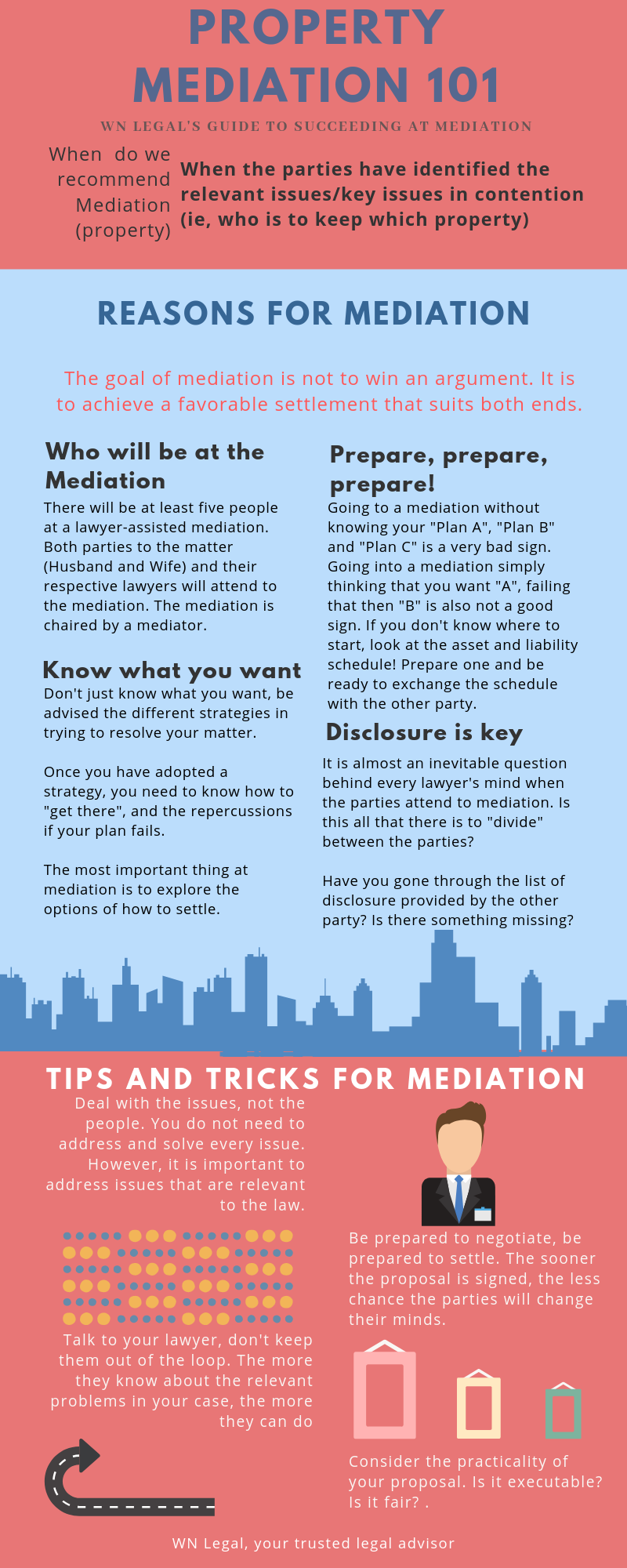Originally posted on https://www.wnlegal.com.au/family-law-mediation/
Why choose Mediation?
Family Law Mediation is a structured negotiation process where you and the other party come to the table to resolve and create a solution that finds some middle ground between both parties’ ideal outcome. The goal of mediation is not to win an argument. It is to achieve a favourable settlement that suits both ends. Otherwise, the parties may choose to litigate proceedings at Court, which can often leave both parties feeling unhappy with the result.
The mediation process is conducted with the assistance of a third party, known as the Mediator. The Mediator will not make decisions on behalf of the parties. However, the Mediator will actively assist the parties in the negotiation process with the goal of reaching a suitable outcome. With the consent of the parties, some mediators (especially barristers or senior counsels) are willing to provide a recommendation on the possible outcome if the matter goes to a trial. In our view, this is a highly effective way of conducting mediation. It also serves as a “wake up call” if one party is asking for the impossible.
If you are looking for a personalised solution to your conflict, then mediation can help you achieve this in a cost and time effective manner. If you approach mediation with strategic choices and an open mind, it can provide a satisfying result.
A face to face discussion after everyone has agreed to an asset and liability schedule is better than sitting behind a computer and writing legal correspondence to each other.
Pre-Mediation Preparation
In mediation, preparation is the key to success.
You should know what is your best-case scenario, and worst-case scenario.
The chances of achieving a successful result at Mediation is highly dependent on the quality and quantity of the preparation. During the preparation stage, it is important to understand your goals and objectives for initiating a mediation or attending to one. Moreover, keep in mind that your objective is to find a solution to the parties’ problem.
Ensure that you consider how you might respond to any proposals put to you by the other party, including any possible worst-case scenario. Understand that the other party may provide you with new information during the mediation process that you may not previously have been aware of. You must expect the unexpected and be prepared for the prospect that you may need to make some tough decisions in order to resolve the dispute.
When you are prepared, you will be better equipped to generate other options and a range of outcomes that may be acceptable to you.
Can I use Mediation in my family law matter?
In many family law cases, regardless of their complexity, mediation is a viable option for resolving the dispute. In fact, it is even a requirement of the Family Court in certain instances that the parties attend mediation prior to commencing proceedings. The earlier the parties mediate, the greater your chances are for a positive outcome. With respect to the Family Court, mediation can be useful in both property and children matters. Final agreements, such as a Minute of Consent Orders can be negotiated at mediation.
Mediation in Children Matters
You may want to consider the practicality of any proposals you intend to put forward at mediation in order to ensure that your plan is workable. For instance, you may wish to discuss with your employer about the option of flexible working hours, or you may need to ask a third party if they are willing to assist with handover arrangements.
Where possible, the parties should have considered the following issues prior to attending to mediation:
- Identify the concerns that each parent has in relation to the children;
- Identify whether the parties are willing to co-parent;
- The children’s living arrangements;
- Education and after school activities;
- Handover arrangements;
- Spend time during school holidays;
- Relocation matters; and
- Travel arrangements.
Mediation in Property Matters
In property matters, issues in dispute often involve determining how the parties’ asset pool will be distributed. Prior to attending mediation, it is helpful for both parties to have completed some prior preparation, including.
1. Disclosing all assets and liabilities and financial resources
In Family Court proceedings, all parties have the duty to disclose information pertaining to their current financial circumstances. Without a true understanding of the entire asset pool, it is impossible to reach an agreement as to the distribution. Some examples of documents that should be disclosed to the other party prior to the mediation are as follows:
- Details of your income or earnings;
- Details of your superannuation;
- Details of any trusts, companies or businesses in which you have an interest in;
- Details of property you have disposed of in the 12 months prior to and since separation;
- Copies of any appraisals or valuations of any real estate you own; and
- Redbook or carsales.com estimates of the values of any vehicles you own.
2. Consider the law
The division of an asset pool largely depends on several important factors. For married couples, these are specified in section 75(2) of the Family Law Act1975, or section 205ZD of the Family Court Act 1997 for de-facto couples. Some of the factors include initial contributions, financial and non-financial contributions, future and financial factors.
3. Prepare a variety of proposals to put forward
4. Know what percentage of the asset pool you are entitled to before making an offer
5. Understand the implication and practicality of implementing your desired proposal
The role of your legal representative
Mediation is best thought of as a team effort. It is a highly specialised field requiring a very specific skill set. The level of success you attain through mediation highly depends on the preparation of the parties. Furthermore, it is important to identify the issues in dispute strategically. The best way to prepare, overcome the challenges you may face pre-mediation, and achieve a positive outcome is to engage with an experienced lawyer prior to the mediation. The pre-mediation preparation done with your lawyer can significantly affect your prospects of attaining a positive outcome that suits your interests and proposals.
Deal with the issue, not the people
When times are tough at mediation, it is the lawyer’s role to assist the parties to deal with the issue at hand, rather than the conflict presented by a person. You do not need to address and solve every issue. However, it is important to address issues that are relevant to the law.
Strike when the iron is hot
When the parties come to an agreement with a proposed offer, be prepared to have a draft proposal for the parties to sign. The sooner the proposal is signed, the lesser chance that the parties will change their mind.
All offers made during the mediation process are made on a without prejudice basis. If an agreement is reached, it is prudent to sign or formalise any agreed proposal before the parties leave the session.
Who pays for mediation?
The parties may choose to split the mediator’s fees equally. Alternatively, one party may choose to pay for the fees of the mediator. If you are already involved in court proceedings, and the dispute does not resolve during mediation, then the court will be asked to review all costs associated with the mediation and make a decision regarding how the costs are to be paid.
There is a strong incentive for the parties to split the mediation fees, otherwise, the non-paying party may be attending the session for ulterior purposes, leaving the paying party to bear the costs and consequences if the parties do not settle at mediation.
Representation and Legal Advice
At WN legal, we can provide representation at mediation. We can also assist you with any preparation prior to mediation, including drafting any required mediation conference particulars and proposed consent orders.
If you need assistance and legal advice in relation to your prospects in mediation, you can contact our family lawyers in Perth on 08 9349 2196, or e-mail us at [email protected].

